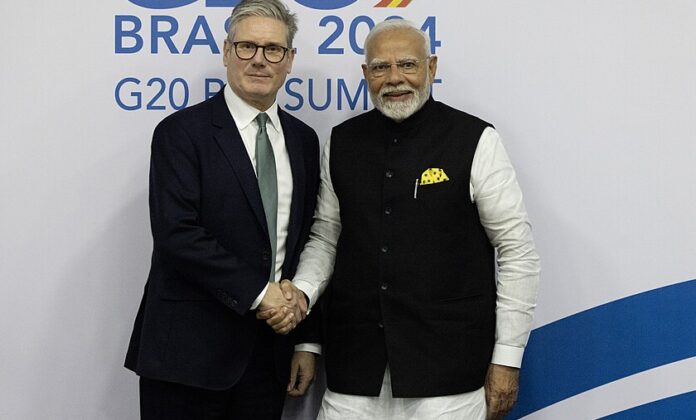Trade deal’s national insurance exemption for Indian workers sparks accusations of betrayal
The UK-India trade deal, hailed by many as a Brexit victory, has become embroiled in controversy over a national insurance concession that critics claim “sells out British workers.” A row has erupted after the government agreed to exempt Indian workers seconded to the UK on short-term visas from paying National Insurance contributions (NICs) for up to three years. This move has triggered backlash, with figures like Kemi Badenoch and Nigel Farage accusing the government of undermining British workers’ rights and allowing foreign competition to flood the market.
The £1bn trade deal, finalised this week, promises a boost to the UK economy, with benefits like cheaper goods, access to a booming Indian market for luxury products, and opportunities for British whisky producers and car manufacturers. However, the NIC exemption for Indian workers has overshadowed these benefits, sparking outrage from senior political figures.
Farage led the charge, accusing the government of “opening the doors wider” to Indian workers, claiming that the deal would result in thousands more coming to the UK. He also argued that this would make it easier for Indian businesses to hire workers while disadvantaging British employees. Similarly, Badenoch labelled the exemption as “two-tier taxes”, suggesting that the deal created an unfair playing field for UK workers.
The NIC concession is expected to cost the Treasury around £100 million in lost tax revenue. However, Business Secretary Jonathan Reynolds downplayed the figure, saying that the deal is expected to generate an additional £1bn in tax revenue and will affect only about 20,000 Indian workers currently in the UK. Reynolds insisted that such agreements were not uncommon, pointing out that the UK has similar agreements with over 50 countries, including the US, Canada, and Japan.
Despite this, critics have raised concerns about the potential implications of immigration. Farage’s claim that half a million Indians arrived in the UK over the past two years is seen as a misleading exaggeration. However, there are worries about the impact of reciprocal agreements for temporary workers from India. While many Indian workers will not benefit directly from this deal, the long-term effects on migration policies remain unclear.
In terms of visas, the deal has limited provisions for Indian workers. While it opens a visa route for yoga instructors, musicians, and chefs, these professionals must meet the usual salary and skill requirements, and the visas are capped at 1,800 per year. This was a far cry from the Indian government’s initial demands for a more expansive visa system.
The deal has also raised concerns in the agriculture sector, with some fearing that reduced import taxes on Indian goods, such as frozen prawns, could harm UK farmers. While UK officials argue the deal will benefit farmers by lowering Indian tariffs on British food exports, particularly lamb, the full impact of reduced tariffs on certain products is yet to be fully assessed.
Embed from Getty ImagesDespite the backlash over the NIC exemption, the deal does include some service sector benefits, such as access to Indian government procurement for British firms. This is seen as a win for the City of London, particularly in light of Trump-era tariffs on trade. However, many feel that the trade pact prioritises goods over services, leaving UK service providers with limited access to India’s burgeoning markets.
In conclusion, while the UK-India trade deal brings significant potential benefits to certain sectors, the political fallout surrounding the national insurance exemption and its impact on immigration policy has left many questioning whether the deal truly serves British interests or if it is a political compromise that will ultimately harm local workers.
BBC
The UK government has defended a controversial part of its new trade deal with India, which exempts workers on short-term visas from paying National Insurance contributions for up to three years. Critics, including opposition parties and Conservative leaders, argue that this could undercut British workers by making Indian workers cheaper to employ. Business Secretary Jonathan Reynolds countered, stating the deal wouldn’t harm British workers, as it only applies to short-term assignments and is in line with agreements preventing double taxation in over 50 countries. The deal, which will boost trade between the UK and India by £25.5bn by 2040, includes benefits like reduced tariffs on Scotch whisky, cars, and clothing exports. Reynolds also emphasised that the deal offers unprecedented access to India’s procurement market, benefiting UK firms and creating jobs, particularly in Scotland and the North.
REUTERS
UK Prime Minister Keir Starmer dismissed claims that the UK government had compromised British workers in its trade deal with India, which includes a three-year exemption for some Indian workers from paying into the UK’s social security system. Starmer called opposition criticisms “incoherent nonsense,” pointing out that similar arrangements exist in agreements with over 50 countries, including the EU and Canada. The deal, which also includes tariff cuts, is expected to boost trade between the two nations. While India hailed the social security exemption as a “huge win,” the UK government emphasised that the arrangement applies equally to British workers in India. Opposition parties, however, argued that the deal unfairly benefits India at the expense of British jobs.
